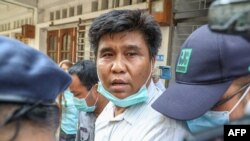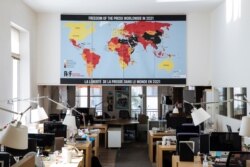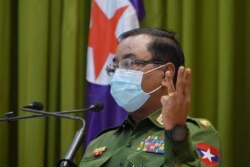On Tuesday last week, Nay Myo Lin, chief editor of the independent Voice of Myanmar, was taken into custody, along with one of his colleagues.
The reasons given for the arrests were unclear, but they follow a pattern that has formed since Myanmar's military stepped up efforts to halt news coverage of its February 1 coup and the protests that followed, says Myint Kyaw, a former spokesperson of the Myanmar Press Council, an independent body set up to handle press disputes and ethics queries.
The concerns for press freedom in Myanmar right now are huge, Daniel Bastard, head of the Asia-Pacific desk at Reporters Without Borders (RSF), told VOA.
The media watchdog says the coup has set Myanmar back 10 years. While it ranks 140 out of 180 countries, with one being the most free in RSF's latest index, Bastard said, "The actual ranking doesn't really reflect the real situation of Myanmar at the moment."
Bastard said he anticipates Myanmar's ranking to drop significantly in next year's index if the situation there continues.
Since the military overthrew the democratically elected government in February, violence in Myanmar has escalated, with frequent clashes occurring between the junta and civilians. Journalists covering the unrest find themselves arrested on charges of spreading false news or inciting protests, injured, or silenced through media blackouts and bans.
As of Monday, the Thai-based rights organization Assistance Association for Political Prisoners in Burma reports that 766 people have been killed since the coup and that 3,614 people are currently in detention.
The United Nations has condemned Myanmar's media crackdown. During a briefing on World Press Freedom Day on Monday, UN spokesperson Stephane Dujarric said the international body wants the "immediate release of dozens of journalists who are still detained more than three months after the military seized control of the government."
"To date, military authorities have revoked the operating licenses of six major Myanmar media outlets. Some 82 journalists have been arrested, and more than half of them are still detained," Dujarric said.
The military has said that measures such as internet blocks were needed to protect national stability. And in March, Brigadier General Zaw Min Tun, the head of the State Administrative Council press team and spokesman for the army, said that the military arrests only journalists who incite unrest and that it "respects and values media freedom."
The security of journalists on the ground is RSF's top concern, Bastard told VOA, adding that "the fear of arrest is a real threat."
Nay Myo Lin's detention last week followed a weekend of raids by military forces.
On April 25, Ko Thura Soe, a photojournalist for the independent Democratic Voice of Burma was arrested in Yangon by authorities checking overnight guest registrations, a close friend told VOA's Burmese service. Military forces have told citizens they must register overnight guests at ward administration offices.
Authorities confiscated Ko Thura Soe's belongings, including his computer.
Writer and media trainer Ma Tu Tu Tha was also detained when authorities checked overnight visitor registrations in Yangon.
Tu Tu Tha, who teaches journalism and worked previously as an editor for The Irrawaddy (Burmese Edition) and editor-in-chief of Thanlyin Post, was arrested on April 24 along with her brother Ye Naung, her son Nyan Lu Thit and his friend.
A neighbor and friend of Tu Tu Tha told VOA Burmese that some 20 military and police raided the former editor's home. "The whole house was searched thoroughly, even under the mattresses," the neighbor said. Troops confiscated phones and laptops, a relative said.
Independent journalism has also come under attack. Since March 17, no independent print media have been in circulation, leaving only state-run outlets, according to RSF.
Last week, security forces raided the local news site Monywa Gazette and attacked the news outlet's owner. Monywa Gazette halted publication as a result.
The military has also disconnected wireless internet and mobile data services.
"Internet services were stopped, we have no access to social media, news agencies are shut down, journalists are on the run," a journalist, who asked to remain anonymous, told VOA Burmese. "The only possible news outlet for our people is foreign media. Some major cities issue newsletters, but small towns are relying on radio."
Myanmar's military has been condemned by the international community. Over 280 members of the ASEAN Parliamentarians for Human Rights worldwide signed a statement calling for the immediate and unconditional release of elected members of the Myanmar Parliament, along with those who have been arbitrarily detained since the coup.
The statement called for Myanmar to uphold democracy and the rule of law.
Members of the Myanmar diaspora have demonstrated against the military in the Netherlands, the U.S., Japan and Britain.
Khin Soe Win contributed to this report.






